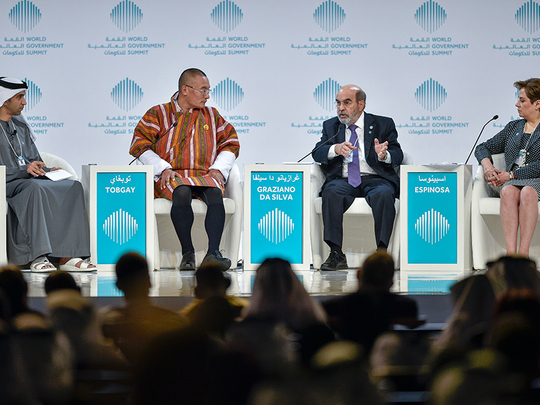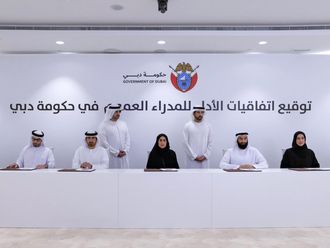
Dubai: A global food revolution is needed to stem looming food shortages, food waste and worsening climate change in years to come, said senior global experts in a panel discussion at World Government Summit on Monday.
But governments can’t do it alone — individuals can achieve food security through a conscious effort to conserve food from waste and help the environment.
The panel is part of the first Climate Action forum by the UAE Ministry of Climate Change and Environment to be held every year at World Government Summit. Dr Thani Al Zeyoudi, UAE Minister of Climate Change and Environment, said the world wastes $2.6 trillion worth of food every year at a time when farmers are leaving rural areas for the cities.
The issue is of concern in the UAE as well, he said, when combined with global fears of growing food security and waste.
“It is a $4 billion [a year] problem in the UAE,” Al Zeyoudi said. “We need food efficiency.”
Greater use of new agri-technology, he said, can increase “food efficiency for production that will produce food with 99 per cent less water.”
Greater care is needed from the farmer’s field to kitchen table if the world is to sustain growing food demand that will spike by 50 per cent by 2050, Al Zeyoudi said.
Jose Graziano da Silva, director-general of the United Nations Food and Agriculture Organisation (FAO), said the food security issue is compounded heavily by the astronomical amount of food wasted daily around the world.
“We need to waste less food, one-third of the food we produce is wasted,” da Silva told delegates.
Da Silva said entirely new approaches are needed for the global food system to help fight climate change.
”We need to transport less food over distances,” he said, “to reduce greenhouse gases from food transport.”
Patricia Espinosa, executive secretary of the United Nations Framework Convention on Climate Change, said the recent Paris Agreement adopted in December 2015 now has been ratified by 129 countries as a blueprint for decades to come to hold global temperatures to less than 2 degrees Celsius.
Fighting climate change may help limit the massive impacts upon agriculture that disruptive weather patterns and storms could bring down the road, she said.
“There is a need for us to accelerate action in order for us to build agriculture,’ Espinosa said. “Food waste is something that starts with the individual and his activities.”
Tshering Tobgay, Prime Minister of Bhutan, said food security is critical in his country where 64 per cent of citizens depend on agriculture for a living.
Fighting climate change in years ahead is critical to stop changes already happening in his country, he said.
Tobgay said that “because of climate change, glacial lakes are breaking dams and wreaking havoc downstream.”












